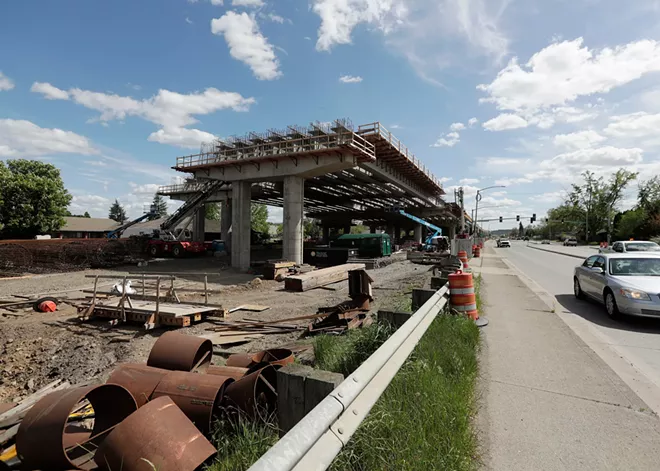Many Spokane residents are unfazed by the broken record of threatened (or real) delays in completing the North Spokane Corridor, which broke ground in 2001.
Just months ago it looked like the construction project could have been paused again due to a $1 billion deficit in the state transportation budget for the next biennium. Eastern Washington city officials and state lawmakers expressed concern about a potential pause in an already delayed project.
On March 11, after attending a city action day in Olympia, Spokane Valley City Council member Ben Wick told fellow council members about his concerns that the corridor could be paused as other transportation projects might be prioritized due to budget constraints.
"It was very evident that the governor's office was trying to highlight that the only project that could be delayed was the north-south corridor," Wick told the council. "It could be delayed up to six years to try and figure out cash flow."
Without a delay, the corridor is expected to be completed by 2030, with 70% of the 10.5-mile connection between North Spokane and Interstate 90 currently completed. According to the Washington State Department of Transportation, the project's estimated total cost will wind up being $1.5 billion.
The Spokane City Council was also concerned about the impacts of a potential delay and on March 31 unanimously voted to send a letter to the House Transportation Committee. The letter described the need to complete the project because other projects depend on its completion.
By 2030, the Spokane Transit Authority expects to complete the Division Street Bus Rapid Transit route, running from downtown Spokane to the unincorporated area of Mead.
"Further delays risk compounding costs, eliminating jobs, and missing a critical opportunity to realize the full potential of this project for Spokane, Eastern Washington, and for the statewide transportation network," the letter states.
To address the transportation budget shortfall, Democratic Washington legislators compromised with a transportation budget that includes a 6-cent motor vehicle fuel tax increase. The fuel tax increase is the first in nearly a decade, and raises the rate from 49.4 cents per gallon to 55.4 cents, which will increase by 2% each year for inflation.
Only California (57.9 cents/gallon) and Pennsylvania (57.6 cents/gallon) have higher gas taxes than Washington.
Other fee increases associated with the transportation budget include a 3-cent increase for diesel and a 10% sales tax on luxury cars over $100,000, which will take effect in July after Gov. Bob Ferguson signs the transportation bill as expected.
In a press release, the city of Spokane noted the final transportation budget includes $51.7 million to complete the North Spokane Corridor.
State Sen. Marcus Riccelli, D-Spokane, says he was resolved to ensure the funding was there to complete the corridor. He says construction costs went up statewide because of tariffs, inflation, and higher material and labor costs.
Riccelli says he wanted to ensure the corridor received funding if the gas tax was increased, because of the positive impacts the freeway will have on the region's economy and development.
"If a gas tax was going to get passed, I was going to ensure we were going to get the most for our region, and make sure that there was no pushing back in the timeline for the North Spokane Corridor," Riccelli says. "It's great for economic development, creates jobs, reduces emissions, so it's better for our environment, and it reduces travel time and will get people home quicker."
Riccelli says the importance of completing the corridor is amplified by regional trade from neighboring states and Canada, STA's rapid transit plans for Division Street, and the need to increase mobility access to various neighborhoods in Spokane.
Spokane City Council member Paul Dillon says the bold fuel tax proposal was needed to fund the $51.7 million required to complete the corridor. He says the 3rd District lawmakers advocated successfully to meet the needs of Spokane residents.
"I am proud our 3rd Legislative District fought for Spokane in this package and that it passed with bipartisan support," Dillon says by email. "It's exciting that this budget finishes the job on the North-South Corridor, especially after the Spokane City Council unanimously passed a letter in support."
Dillon notes that the gas tax and additional vehicle-related taxes will also help fund many projects that will improve bicycle and pedestrian safety despite the uncertainty of federal funding cuts.
"This increase will be incredibly important in the wake of impending federal cuts to federal walking and biking funds over the next three years or more," Dillon says. ♦

